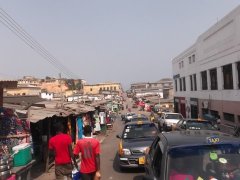Unfortunately, the waste disposal situation of the country is extremely poor. Littering is commonly  seen. Every item is wrapped in plastic and you can see plastic bags everywhere. People just throw sachets of water (plastic bags), and any other trash, everywhere in the streets, in front of buildings, in and out of buses, even in the business districts, without anyone blinking an eye. According to the media, only one percent of plastics are recycled in Ghana.
seen. Every item is wrapped in plastic and you can see plastic bags everywhere. People just throw sachets of water (plastic bags), and any other trash, everywhere in the streets, in front of buildings, in and out of buses, even in the business districts, without anyone blinking an eye. According to the media, only one percent of plastics are recycled in Ghana.
There is no doubt that people throwaway more plastic bags in US. According to Ghanaian media, in US every hour 2.5 million plastic bottles are thrown away, (is it true?). The amount of waste generated in Ghana is nothing compared to any developed country. The problem in Ghana is lack of any waste management infrastructure; thus, you can easily see and smell the waste and it can have serious consequences for the environment and public health.
For example, urinating in the streets is very common. Last night, in the dark, when we were walking to our bungalow we saw a taxi parked about ten feet away from our house. The driver was standing out. We thought maybe he was waiting for someone. As we approached him he turned around…. Sure enough he was emptying his bladder! I loudly asked, “Are you taking a piss in front of our bungalow?” He said something and got into his taxi….. it was too dark to see anything; we wished to believe we were mistaking! On a different occasion, last week when we were traveling to Kumasi, the bus made a quick stop and all of a sudden all the guys got out. They all lined up a mere three feet from the bus and started urinating. The most interesting scene was seeing a guy urinating right in front of a Sterilization Department of the largest teaching hospital in town! It is hard to understand any of these unless you are in the middle of the town and you have to “go”! Good luck finding a toilet! Many people, rightfully argue that it is the lack of any sanitary facilities that has created this culture.
Cutting the trees is common practice. It is possible that in a matter of a single day all of a sudden a large number of trees disappear in order to open space for some type of construction work. Often times the cut trees are burnt (this is the cheapest way to get rid of them) and the smell can be very intense for the neighboring communities.
While observing all these, one must consider several issues. First, due to lack of solid infrastructure and proper housing, for many people living in poverty, there is really no boundary between where they live, the animals are fed, the stream of water is running through, food venders sell or serve food, open drains and gutters are located, children play or bath; they are all meshed together. Not surprisingly, such unhygienic conditions have posed serious health risks to the society as a whole.
The second important thing to remember is that, apparently, in Ghana there used to be a time that 
 people were afraid of health inspectors, regularly giving them a visit. Perhaps they are still around but no one cares about them, because they can easily be bribed! Also, keep in mind that all the gutters and open drains date back to the colonial master, British time.
people were afraid of health inspectors, regularly giving them a visit. Perhaps they are still around but no one cares about them, because they can easily be bribed! Also, keep in mind that all the gutters and open drains date back to the colonial master, British time.
Many argue that education is one key factor to ensure people keep Ghana clean! Some say the government must use strict law enforcement against littering to ensure practices such as littering is reduced. Closing gutters and open drains, obviously, will be nice to happen!
One of the ministers in the newly elected government has recently declared the issue of sanitation as the “national priority” (of course, the new president thinks I the national priority is the lack of electricity, and city officials think the national priority is providing fresh water to everyone….so, I am not really sure ….)
When it comes to sanitation, as outsiders, we don’t really see any serious outreach program anywhere. There are a few music videos (songs and melodies) that are broadcasted on TV, promoting sanitary practices to put an end to “disgraceful practices.”
But we cannot stop thinking that why the government does not join hands with Kings, chiefs, pastors, and Imams to educate people about littering and sanitary issues. It is easy to see how religious activities are massively ballooning and a high level of productive time is spent on religious services (in Ghana Muslim prays FIVE times a DAY and a typical Christian easily spends THREE hours per service in the church per day). In big cities a good number constructions belongs to churches planning to expand. They say, “In Ghana, the fastest way to get rich is to become a pastor.” Almost every student of mine is somehow involved in some type of church activities, ranging from singing to ushering attendants.
In addition to churches, each community has a chief and queen. For example, the Central region actually has a very powerful KING, who is residing in Kumasi (he is a board member of one of the major public universities and his picture is on several large billboards in town promoting education. Such individuals have great influence to make real changes that can significantly improve the living conditions in many communities.
Of course, building more sanitary facilities will be very helpful.
Creating some type of incentive programs can be very effective. For example, nowhere Cape Coast  you can find empty plastic water bottles or Coke bottles, because if you return them you can get some money back, or people just use them as containers. Imagine if we come up with a way to recycle plastic bags and provide monitory incentive for returning them; there will be a HUGE change! Go think about it……
you can find empty plastic water bottles or Coke bottles, because if you return them you can get some money back, or people just use them as containers. Imagine if we come up with a way to recycle plastic bags and provide monitory incentive for returning them; there will be a HUGE change! Go think about it……
While there are many environmental challenges, you can easily find many opportunities to create new businesses in Ghana! In that past two months we have come up with two very simple solutions that can really sell! Four of my students, are developing working prototypes and they believe they can start a business after they graduate… Anything from waste management, water monitoring, developing biodegradable containers, developing reliable Internet cafes that people can attend online conferences and classes, teaching management and organization development workshops, developing and implementing Learning Management Systems, and much much more…..of course the big problem for Ghanaians is always lack of resources and seed money…. there is no doubt that the new generation of Ghanians is very mush motivated and willing to build a better and more sustainable future, and participate in the development of their own economy……
